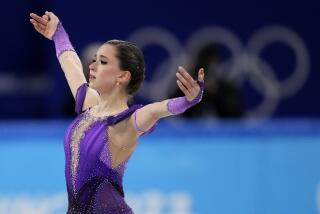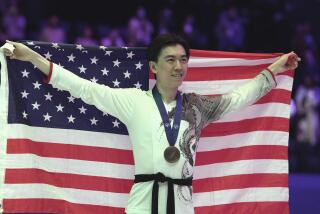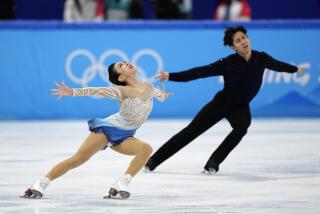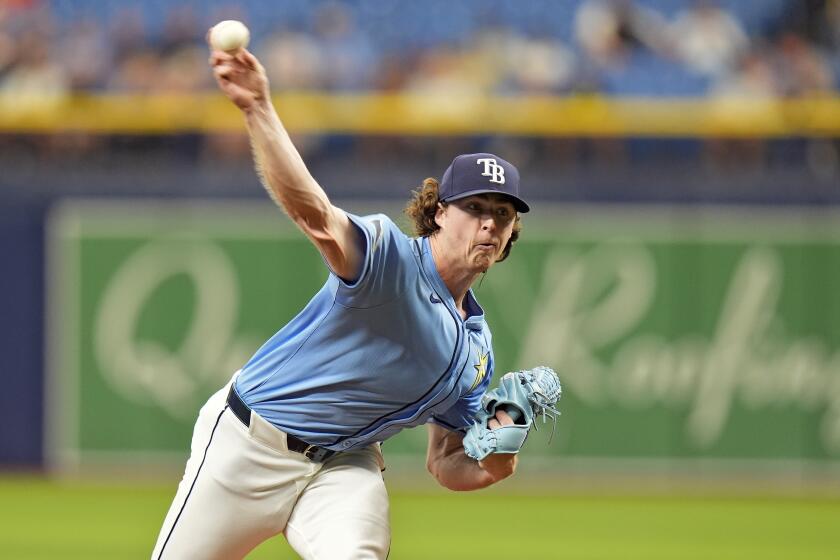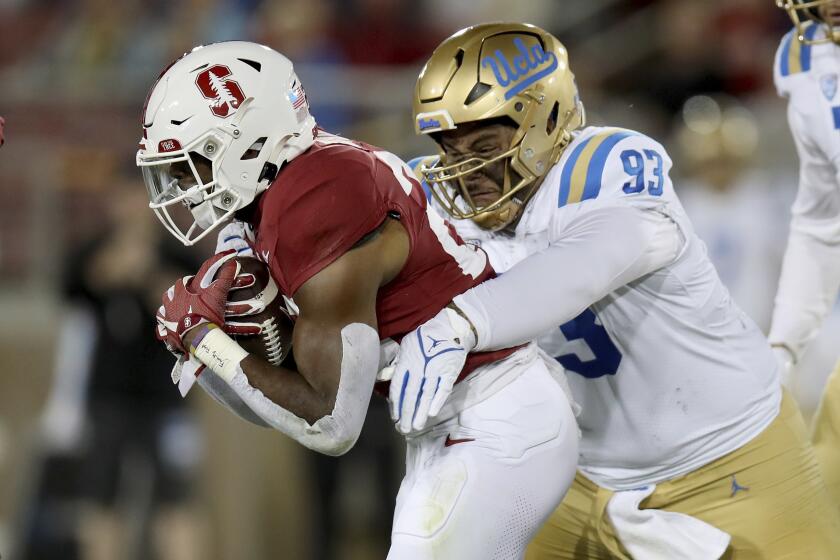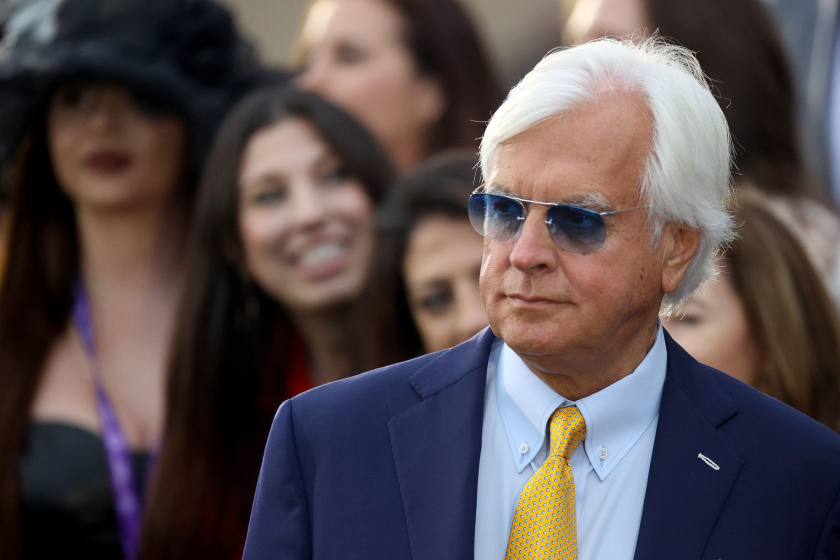Column:: Japanese icon Yuzuru Hanyu dreams of delivering another figure skating gold-medal program
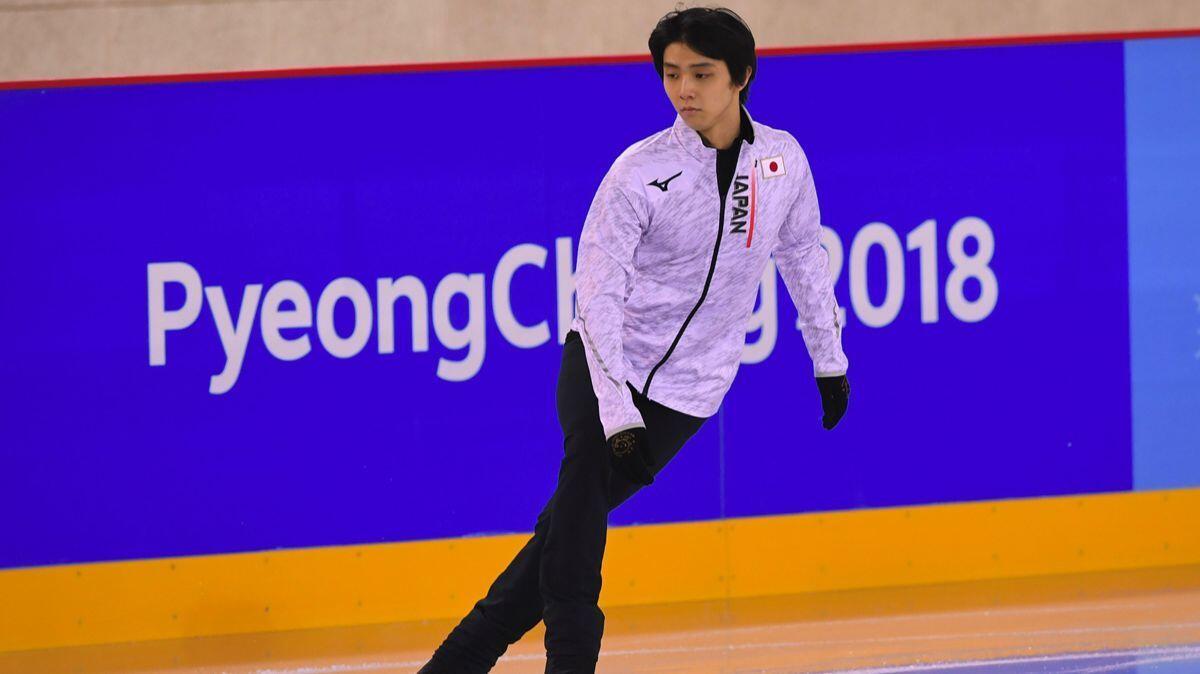
The Olympic volunteers in the red and gray tracksuits walked down to a section of seats in the lower half of Gangneung Ice Arena and asked the reporters there to relocate to the upper deck.
“For the spectators,” one of the ushers said.
Fifteen minutes later, the arena opened to the public and a stream of fans burst through a set of double doors, sprinting toward the choice seats. These people obviously didn’t share Allen Iverson’s view of practice, at least not when the practice in question included Yuzuru Hanyu.
The defending men’s figure skating champion, the 23-year-old Hanyu is the only genuine superstar of these Olympics.
Shaun White and Chloe Kim are enjoying moments in the spotlight, but would never be compared to LeBron James or Tom Brady. Hanyu is as, if not more, popular than any athlete in Japan today, and that includes Shohei Ohtani of the Angels, who captivated the island nation by throwing 100-mph heaters and launching 500-foot moonshots for the Nippon-Ham Fighters over the previous five years.
Hanyu’s defense of the Olympic crown will start Friday in the short program and it’s entirely conceivable that more than half of Japan will be watching. The live broadcast of his triumph in Sochi, Russia, four years ago was on nearly a quarter of Japanese television sets, even though his free skate program was aired at 4 a.m.
Mystery has amplified Japan’s already-fervent interest in Hanyu. The two-time world champion injured his right ankle in November and publicly resurfaced only this week when he landed at Incheon International Airport. Six policemen in sunglasses shielded him from the 100 or so fans who waited for him.
Hanyu’s news conference Tuesday was attended by more than 150 reporters, the overwhelming majority of them from Japan. There were nearly as many people in the interview room as there were three days earlier when South Korean short-track speedskater Hyojun Lim won the 1,500-meter competition to claim the host nation’s first medal of these Games.
What was evident over the 24-minute question-and-answer session was that Hanyu’s confidence was not diminished by his extended absence. His workout that morning marked the second time Hanyu skated in public since the injury. He revealed he returned to the ice only a month earlier.
“I’m confident I’ll win for sure if I skate a clean program,” he said in Japanese.
The boldness of the statement was softened by the inflection of his voice and jerky movements of his head, which projected a child-like innocence. It’s this boyish charm that is fundamental to Hanyu’s wild popularity in a culture that values restraint. His expressiveness, both on the ice and off, is interpreted as youthful enthusiasm instead of self-indulgence.
Hanyu has the overstated smile of an 8-year-old. He used to skate with a tissue-box cover of Winnie the Pooh placed on the wall of the rink; the good-luck charm was replaced this week with a case that resembles a cake, perhaps because Olympic sponsorship rules forbid him from showcasing a Disney image. His especially slender physique reinforces the image that he’s a Peter Pan on skates.
His origin story is also a crucial part of his legend. He is from Sendai, the the region of Japan that was decimated by an earthquake and tsunami in 2011. Hanyu was 16 and practicing on his home rink when the earthquake struck. He ran outside in his skates. His family’s home was damaged, requiring him, his sister and his parents to spend three days in a shelter.
Three years later, he won gold in Sochi, the performance infused with symbolic meaning for a region recovering from devastation.
Hanyu didn’t look or sound burdened by the attention.
“There are only a handful of athletes who get to be interviewed by this many people,” he said. “And it’s not only the people here. The people here will reach more people. I’m filled with a feeling of ‘a lot of people are going to watch me skate.’ You can call that pressure, but I want to fully embrace it because I’m getting a chance to skate competitively for the first time in awhile. For the people who waited for my return, I want to deliver the kind of performance that will make them feel it was worth waiting.”
He also made it a point to thank the fans who sent him messages of encouragement while he was injured.
Hanyu resumed practicing only a month ago, but downplayed how his abbreviated preparation could affect him.
“I’ve been skating for a month and I’m here,” he said. “I’ve practiced enough to where I think I can compete in the Olympics. It’s not a problem.”
If Hanyu wins gold again, he will be the first male skater to repeat as Olympic champion since Dick Button in 1952. Hanyu aspires to that, and more.
“On the stage I envisioned in my dreams,” he said, “I want to deliver the performances of my dreams.”
An entire country dreams with him.
Follow Dylan Hernandez on Twitter @dylanohernandez
More to Read
Get our high school sports newsletter
Prep Rally is devoted to the SoCal high school sports experience, bringing you scores, stories and a behind-the-scenes look at what makes prep sports so popular.
You may occasionally receive promotional content from the Los Angeles Times.
